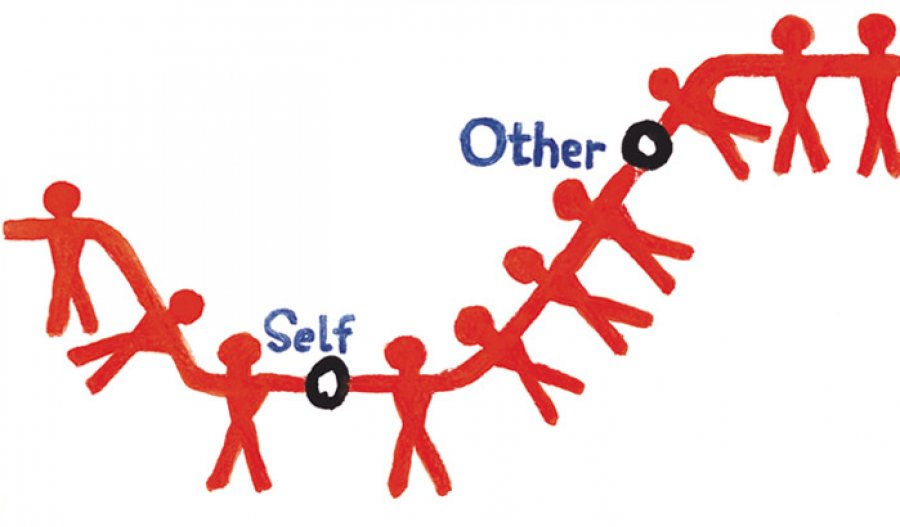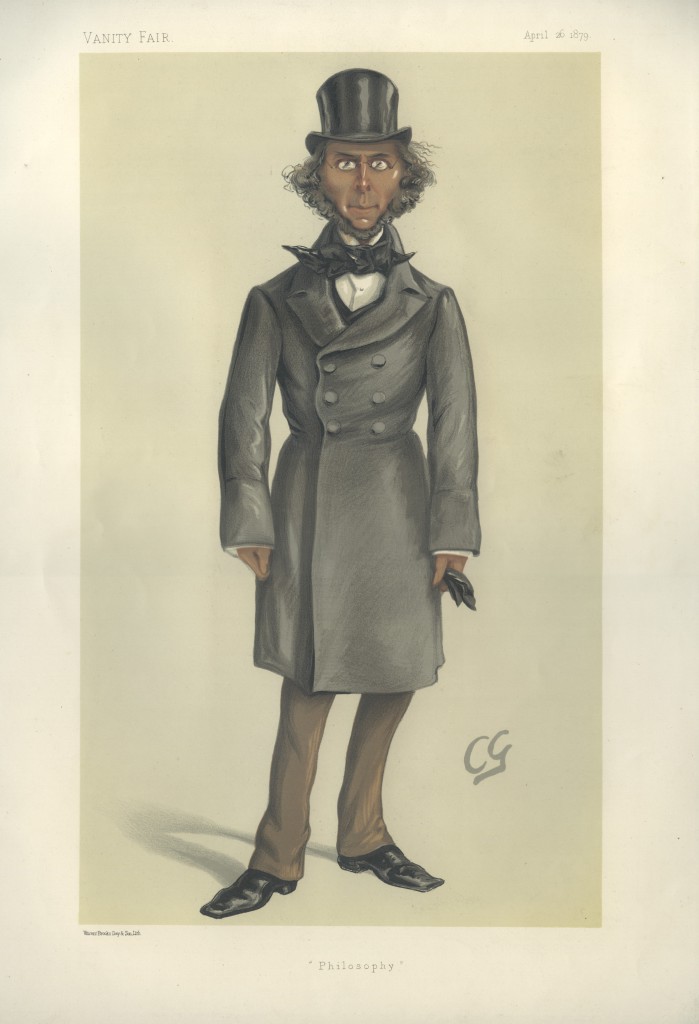This post by Thomas Dixon is the first in a series on Philosophical Keywords, exploring the changing historical uses, meanings and impacts of philosophical terms which have taken on broader cultural resonance.
A couple of years ago, travelling on the Central Line to Mile End on the London underground, I started to notice a series of posters and images like the one below – using the familiar imagery of the London tube map to suggest connections being made between people – the red line was now not linking Liverpool Street to Bank but ‘self’ to ‘other’.
This struck me as an interesting expression of the philosophy of altruism – the idea that the essence of moral goodness is a devotion not to self (egoism) but to others (altruism). The term ‘altruism’ ultimately derives from the Latin word alter, meaning ‘other’. Intrigued by the artworks on the tube, I searched online to find out more about them. It turned out that they were part of a project called ‘Acts of Kindness’ by the artist Michael Landy who said about the project, ‘I want to find out what makes us human, and what connects us, beyond material things. For me the answer is compassion and kindness.’
There is now a kindness movement, with followers all over the world celebrating the value of what are sometimes referred to as ‘random acts of kindness’ towards others – often strangers. Such acts are also recommended by proponents of ‘positive psychology’ such as the UK organization Action for Happiness. The kindness and happiness movements are quite recent phenomena, and they tend to recommend altruism – doing good to others – on the apparently paradoxical basis that it is good for our own mental health. The ideal of altruism to which these movements appeal, however, has a longer, and quite surprising history.
‘Altruism’ entered the English language in 1852. Before then, there were all sorts of moral virtues, philosophical isms, charitable intentions, and perhaps even random acts of kindness too, but no ‘altruism’. The term had been coined just a year before in French – altruisme – by the pioneering philosopher and sociologist Auguste Comte (1798–1857), in his System of Positive Polity (1851-1854). Altruisme was the name Comte gave to the other-regarding social instincts, and he located them physically towards the front of the human brain. ‘Altruism’ was a keyword not just in Comte’s speculative early brain science, but also in the atheistic religion that he founded, with himself as its High Priest – the Religion of Humanity – which was designed as a substitute for Catholicism, complete with its own calendar of secular saints and festivals, and humanistic hymns. The main aim of the Religion of Humanity, along with Comte’s envisaged re-organisation of society (things would be run mainly by bankers and scientists) was to see egoism subordinated to his new ideal of ‘altruism’ throughout the civilized world.

A gallery of some of the secular saints – including men of art, science and politics and a figure representing Comte’s belief in the moral superiority of women – in Comte’s Chapel of Humanity in Paris. Picture credit: J.P. Dalbéra WikiCommons/ FlickR.
In the decades following its coinage, ‘altruism’ really took off. It became a fashionable term first among scientific atheists sympathetic to Comte’s ‘Religion of Humanity’. Later, British philanthropists and socialists of various kinds found it a convenient term to express their devotion to all classes of society and even to the whole human race.[1] The word was initially resisted by clergymen as an unnecessary scientific neologism – one pertinently asked whether it was really a ‘sweeter or better word than charity’ – but eventually it was even appropriated by Christians too, most notably the Scottish evangelical Henry Drummond in the 1890s, as nothing less than a synonym for Christian love.[2] Today ‘altruism’ is a modern philosophical keyword of quite wide appeal, and it still retains a flavour of its scientific and its humanistic origins: it is used both as a technical term in evolutionary biology and as an approving term within those systems of secular thought for which devotion to one’s fellow human beings, or to Humanity as a whole, is the foundation of ethics.
It is pretty surprising that Comte’s ‘altruism’ was such a successful neologism in the English-speaking world. The Religion of Humanity, although it had some followers in Britain, was widely mocked by leading British intellectuals, such as the evolutionist Thomas Henry Huxley (1825–1895) . Comte had been a respected historian and philosopher of the sciences, but as his career wore on, he became obsessed not only with his new religion, but also with the sacred memory of a married woman – Madame Clotilde de Vaux, to whom he had become spiritually and affectionately devoted before she died. In the British press Comte was ridiculed as eccentric, egotistical, tedious and humourless.
Several British visitors to Auguste Comte’s flat in Paris, including the philosophers Alexander Bain and Herbert Spencer, formed very unfavourable impressions of the man. Indeed, the British reputation of Comte in his later years in some ways foreshadows the very negative reception of ‘Continental’ philosophy in Britain during the twentieth century, as something both foreign and dangerous.[3] In his classic work, On Liberty (1859), John Stuart Mill described the social and religious system envisaged by Comte as ‘a despotism of society over the individual, surpassing anything contemplated in the political ideal of the most rigid disciplinarian among the ancient philosophers’.[4]
The two figures who probably had the most impact in spreading the use of ‘altruism’ as a term of both science and ethics in Britain in the century and a half since Comte’s death were both popular writers devoted to the theory of evolution and hostile to religion: the philosopher Herbert Spencer (1825–1903), and the scientific atheist Richard Dawkins (born 1941).
Herbert Spencer was the most famous philosopher of his day. When he was caricatured for Vanity Fair in 1879, the illustration was captioned simply ‘Philosophy’. Spencer was the embodiment of the English philosopher in the mid-Victorian period. He was hugely critical of almost all aspects of Comte’s thought, but borrowed from him the terms ‘sociology’ and ‘altruism’, which he defended as useful coinages.[5] In his book, The Data of Ethics (1879), Spencer gave his own new definition to the term ‘altruism’, using it not to name a kind of moral intention or humanistic ideal, as Comte had done, but to refer to animal behaviour.
Spencer redefined ‘altruism’ to mean ‘all action which, in the normal course of things, benefits others instead of benefiting self.’ Such altruism, Spencer claimed, had been in evidence from the very dawn of life, in the lowest and simplest creatures, and especially in the evolution of the parental instincts which ultimately evolved into social sympathy. In Spencer’s broad defition, ‘acts of automatic altruism’ were to be included along with those with some conscious motivation. The splitting of the simplest single-celled organism, such as an infusorium or a protozoon in an act of reproduction, was also to qualify as an act of ‘physical altruism’.[6]
Almost exactly a hundred years later, Richard Dawkins shot to fame when his book The Selfish Gene, published in 1976. Whereas Spencer had taught that altruism was inherent in all animals throughout the evolutionary process, Dawkins wrote that those hoping to build a more cooperative society could expect ‘little help from biological nature’. Instead, Dawkins exhorted his readers: ‘Let us try to teach generosity and altruism, because we are born selfish.’ ‘We, alone on earth,’ Dawkins wrote, ‘can rebel against the tyranny of the selfish replicators’.[7] The story does not end there, however, as Dawkins had second thoughts about altruism and, in his atheistic manifesto The God Delusion (2007), argued that altruism towards non-relatives was a ‘misfiring’ of a hardwired instinct that evolved through ‘kin selection’ to favour organisms who co-operated with close relatives. We used to live in groups mainly comprised of close relatives, the argument goes, and so our kindness and altruism would almost always be favouring our genetic kin. Nowadays we continue to feel pity and show generosity towards those around us, even though they are generally not our close relatives. This is a misfiring – a Darwinian mistake, but Dawkins adds, a ‘blessed’ and ‘precious’ mistake. [8] Now, it seems, Dawkins thinks we are born altruistic.
Dawkins may have changed his ideas about the naturalness of altruism, but in both cases his writings illustrate a general philosophical problem – namely the difficulty of getting by rational argument from an observation about nature to an ethical imperative – making the journey from ‘is’ to ‘ought’. This problem faces anyone trying to construct an ‘evolutionary ethics’. In the case of the quotation from The Selfish Gene, we might ask why not cultivate individualism rather than altruism? And readers of The God Delusion might reasonably wonder why Dawkins considers altruistic urges to constitute a ‘blessed’ and ‘precious’ misfiring rather than an inconvenient and undesirable malfunction. In both cases, Dawkins’s own ethical preference for altruism seems to have been imported without justification into a purportedly scientific discussion.
So, whether we are contemplating works of art on the tube, or reading popular science books, we might at any time find philosophical ideas and assumptions seeping through. Knowing a bit about the philosophical history of our everyday language can help to keep us alert.
References
[1] Thomas Dixon, The Invention of Altruism: Making Moral Meanings in Victorian Britain (Oxford: Oxford University Press for the British Academy, 2008).
[2] Frederic W. Farrar, The Witness of Christ to History (London: Macmillan, 1871), pp. 144–146; see also Dixon, The Invention of Altruism, chapters 3 and 7.
[3] Thomas L. Akehurst, The Cultural Politics of Analytic Philosophy: Britishness and the Spectre of Europe (London: Continuum, 2010), especially chapter 1.
[4] John Stuart Mill, On Liberty (1859), in Collected Works of John Start Mill, 33 vols, ed. John M. Robson et al. (Toronto: University of Toronto Press, 1963–1991), vol. 18, p. 227.
[5] Dixon, The Invention of Altruism, pp. 202–206.
[6] Herbert Spencer, The Data of Ethics (London: Williams and Norgate, 1879), pp. 201–202; see also Dixon, The Invention of Altruism, chapter 5.
[7] Richard Dawkins, The Selfish Gene, new edition (Oxford: Oxford University Press, 1989), pp. 3, 200–201; original publication 1976.
[8] Richard Dawkins, The God Delusion (London: Bantam Press, 2006), p. 253.
Further Reading
Helena Cronin, The Ant and the Peacock: Altruism and Sexual Selection from Darwin to Today (Cambridge: Cambridge University Press, 1991).
Thomas Dixon, The Invention of Altruism: Making Moral Meanings in Victorian Britain (Oxford: Oxford University Press for the British Academy, 2008).
Fern Elsdon-Baker, The Selfish Genius: How Richard Dawkins Rewrote Darwin’s Legacy (London: Icon, 2009).
Martin A. Nowak and Sarah Coakley (eds), Evolution, Games, and God: The Principle of Cooperation (Cambridge, MA: Harvard University Press, 2013),
Adam Phillips and Barbara Taylor, On Kindness (London: Hamish Hamilton, 2009).



